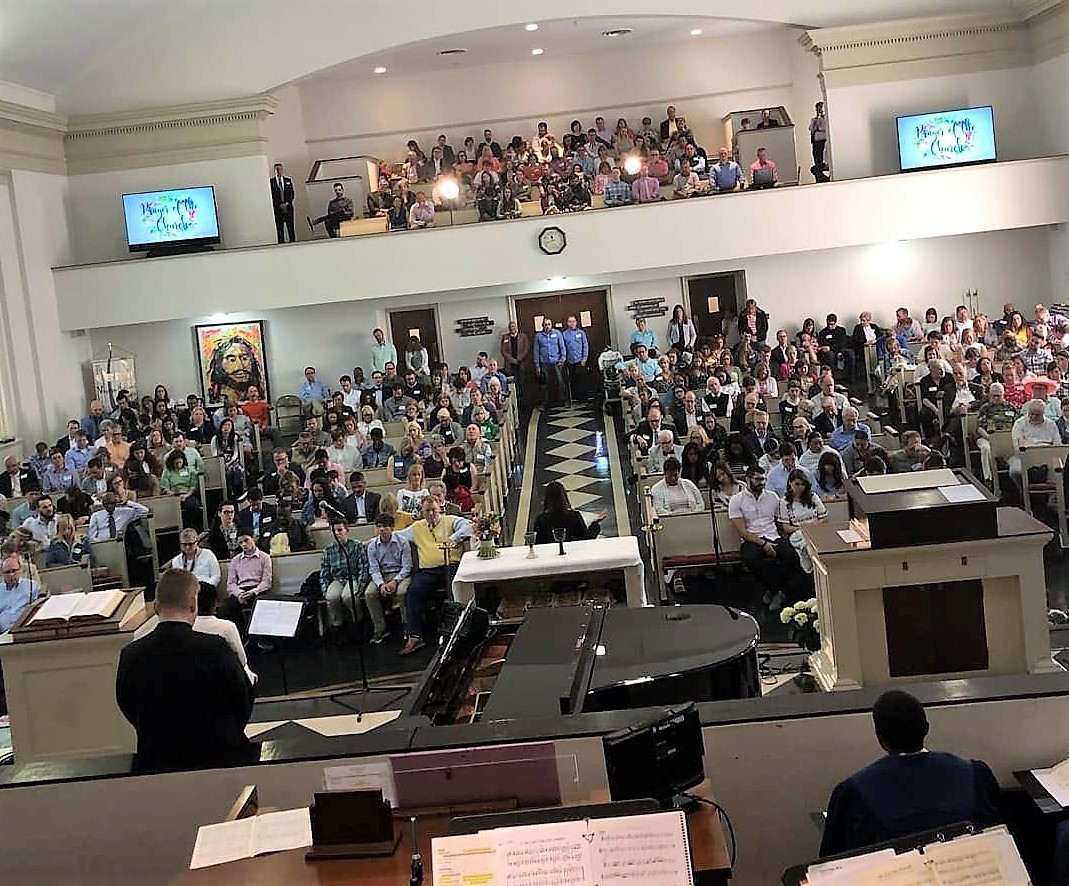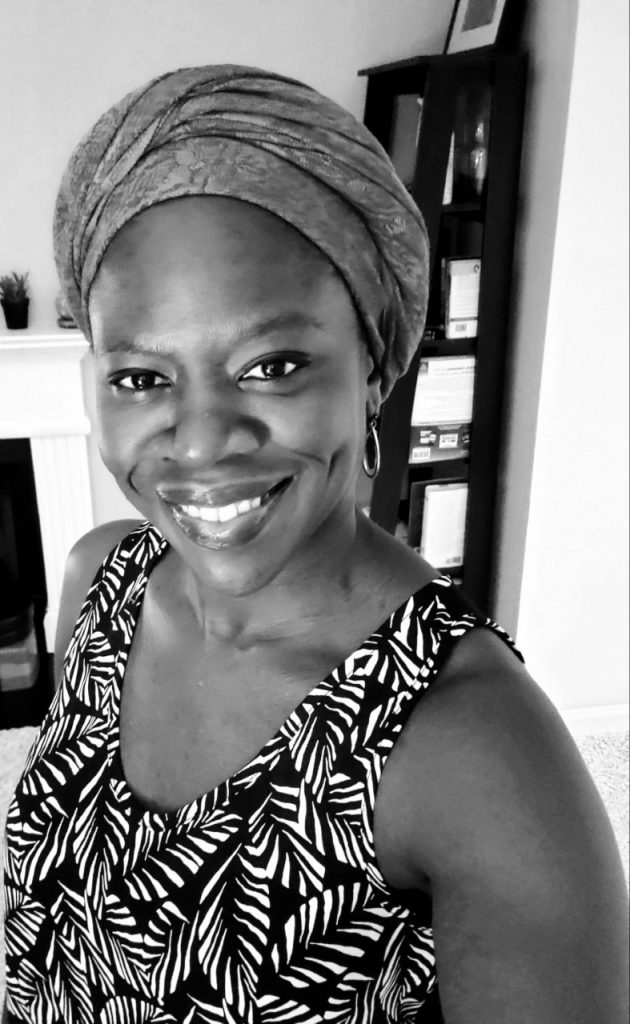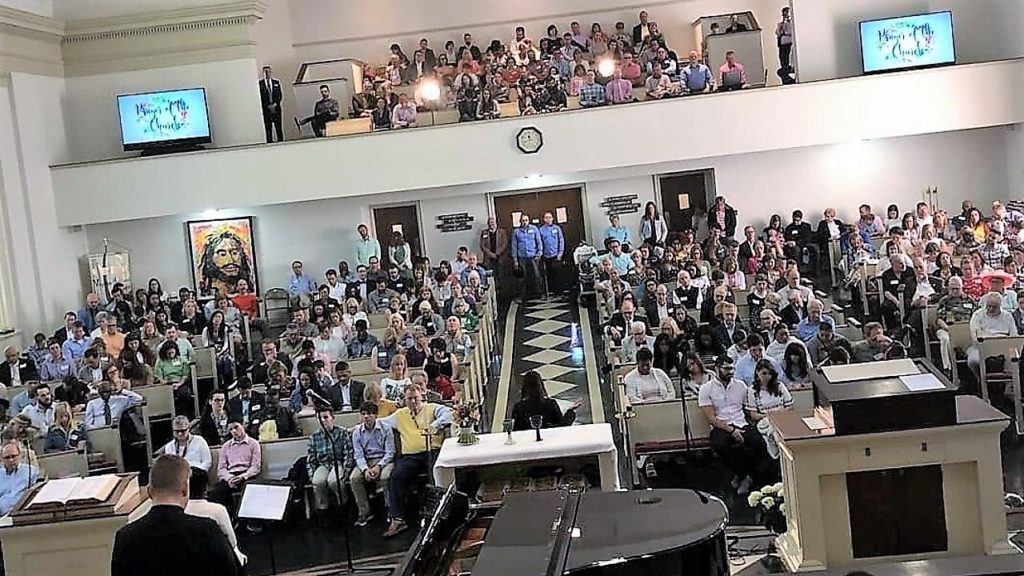Atlanta church consults its doctors about returning to in-person worship
Doctors and scientists who belong to Virginia-Highland Church in Atlanta are “not in a hurry to return to in-person worship” and have recommended masks and other coronavirus precautions when the congregation eventually reopens its building – including changes in seating, music, childcare, the offering, Communion, cleaning and more.
Like most United Church of Christ congregations, Virginia-Highland has responded to the pandemic by holding worship and all other activities online since March. In May, the Rev. Matt Laney, its senior pastor, convened a 10-member “Re-Opening Task Force” to discuss possible guidelines. It includes seven medical and research professionals who belong to the 300-member church.
The team, including professors, doctors and public health officials, has developed working recommendations that are now being followed by the church. Among them: keep the building closed “at least through July,” and do not even consider in-person gatherings until there’s reliable evidence that public COVID-19 infections have dropped steadily for 30 days, especially in the Atlanta area.

‘Jesus was very interested in public health’
“They’re really smart, and very cautious,” Laney said. “Because they’re doctors, they are very keen on good data.” He said the task force will meet again in July, assess the science, and, if warranted, consider extending the building closure.
Laney said he hopes the guidelines – which include that “not in a hurry” statement and are designed to be updated as more is learned – will proclaim a message while also reassuring church members. “I think this is an opportunity for the UCC to broadcast our progressive theology,” he said. “Science matters. God loves scientists. We should listen to them.
“There are a lot of other voices out there. I’ve heard some ministers say, ‘Faith over fear,” as they reopen. I think we in the UCC have an opportunity to present a different message – that taking stock in what scientists say is faithful. To love our neighbors and to protect the public is faithful. Jesus was very interested in public health.”
Awaiting ‘reachable thresholds’ – but not a vaccine
One Virginia-Highland task force member is Boghuma Titanji, M.D., who also has a Ph.D. in molecular virology. As a research fellow at Emory University, she splits her time between studying infectious diseases and seeing patients at four Atlanta hospitals, including some with COVID-19.

One thing Virginia-Highland won’t do, largely because of Titanji’s recommendations, is wait for a COVID-19 vaccine to become available. Part of her doctoral research was about another virus, HIV. In the early years of that late-20th-century pandemic, “there was an announcement made that within two years there would be a vaccine,” said Titanji. “And we still don’t have one. That’s a virus that’s been with us for 40 years, and this virus has been with us only for six months.
“Whenever we set out to develop vaccine for new virus, there’s always the possibility that that may not happen, because viruses are tricky, and vaccines can be challenging. I think there’s a false sense of timeline around the vaccine development for COVID-19. A lot of the leadership of the country is speaking as though it will happen.” Some research on possible vaccines is encouraging, she said, “but even in the best-case scenario, to scale up production to get the 325 million people in this country vaccinated – that’s not going to happen overnight.”
The task force felt that “to pin everything on a vaccine, when there’s not a 100-percent chance that it will happen, was not realistic,” Titanji said. “We should be focusing on identifying reachable thresholds for where we feel comfortable reopening.”
For Virginia-Highland, those thresholds now involve closely watching COVID-19 reports from sources that range from Atlanta-area city and county health departments to the federal CDC. In addition to that steady 30-day decrease in cases, they’ll keep an eye on technical factors, such as “R-zero” rates low enough to indicate that, on average, each existing infection is causing less than one new infection.
No singing, touching, Communion – for awhile
Even then – and this is the longer section of the guidelines – procedures at the church will be different from pre-COVID days. “As a team, we identified the aspects of worship that likely present the highest risk for promoting transmission,” Titanji said “– and if and when we do reopen, how we can mitigate some of those aspects within the congregation so that if people are coming into the sanctuary, we are not increasing the risk.”
The result was these “slow open” guidelines:
- All in attendance must wear masks – their own or one provided by the church.
- Worship will continue to be livestreamed for those who prefer to worship at home.
- Seating will be limited, probably to 50, for a Sunday service that in ordinary times draws some 120 to 150 worshipers. To compensate, two services will be offered. “We will ‘close’ every other pew with blue painter’s tape,” the policy says. “Once we reach our capacity (sanctuary and balcony), we will graciously ‘close’ worship to additional participants.”
- The physical “sharing of peace” will be suspended, because it often involves handshakes or hugs.
- “We will suspend all in-person choir and congregational hymn singing for the foreseeable future, as group singing is one of the most high-risk vectors for the spread of this particular disease.” Musicians will use an app to create music to be played over the sound system and projected on screen during worship.
- “The offering will no longer be collected in the pews.” Worshipers will find offering baskets at the sanctuary exits, and online giving will be encouraged through the church’s existing Tithely, Venmo and PayPal options.
- “Communion and baptism: both will be suspended as we begin in-person worship. As the infection rate decreases, we may introduce a new structure” for each. When Communion returns, it may involve new patterns of distribution, servers with gloves and hand sanitizer, pre-filled containers, and even using just bread alone and reintroducing the cup at a later date.
- “Children will remain with their families during worship and for the children’s lesson in worship. We are exploring our options on opening the nursery and toddler room during service but will need to establish safe capacity and screening guidelines. It may be the case that the nursery can be utilized as a ‘changing station’ for parents of small children, one family at a time.”
And there’s much more, addressing usher and greeter training, building sanitation, hand sanitizing, drinking fountains turned off, and even what worshipers should do if they find out they have COVID-19.
“Anyone who becomes sick within two weeks of worshipping in person at VHC and subsequently tests positive for COVID-19 should inform the Rev. Matt Laney, immediately and confidentially, by email or phone,” the guidelines say. Without identifying the infected person, he will “inform all who worshipped that day of the potential exposure and advise them to consult a physician to seek advice on self-isolation, presently suggested to be two weeks.”
Most vulnerable members ‘foremost in our minds’
As to when the church will be ready to regather, and how long those new protocols will last, “there are no clear answers,” Titanji said. The answers that do come may differ in various parts of the country, she said. “It’s hard. I think a lot of people are struggling with this.”
“All of us know there’s no silver bullet here,” Laney said. “Everybody has to pay attention to the numbers in their region, what makes sense for them and their congregation.”
In communicating the guidelines to the congregation, Laney and Virginia-Highland Governing Board President Michael “MJ” Jackson took a spiritual approach. “None of us anticipated this and all of us are struggling to respond in ways that are helpful – keeping foremost in our minds the most vulnerable members of our church and our community,” they said. “God did not bring our family through 97 years of ministry to abandon us at this challenging intersection. And if God is for us – who can be against us?”
Related News
A Prophetic Call for Justice and Peace in Palestine
The executive leaders of the United Church of Christ have issued the following statement...
Read More‘Love is Greater Than Fear’: Regional Youth Events get to the heart of gospel message
United Church of Christ teens attending this summer’s Regional Youth Events (RYE) are...
Read MoreUCC desk calendars available to order now
Prepare for your day, month and year with the United Church of Christ desk calendar —...
Read More


